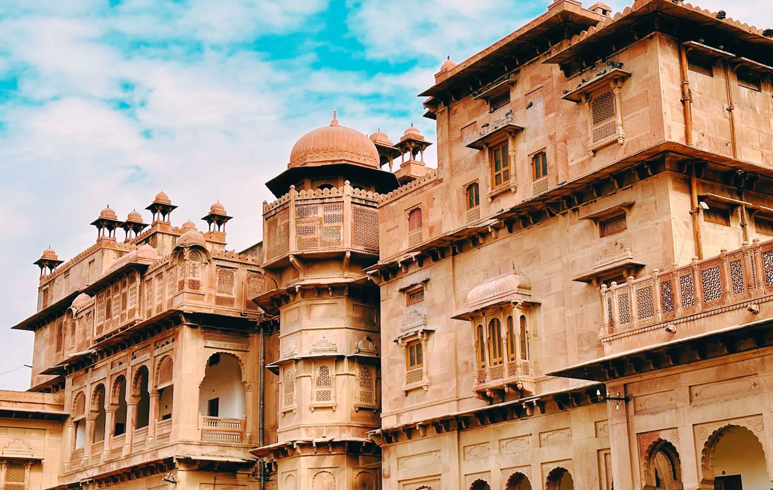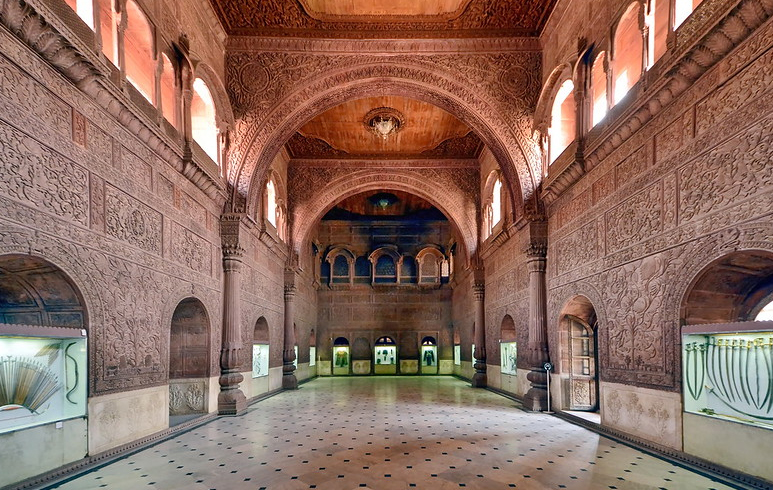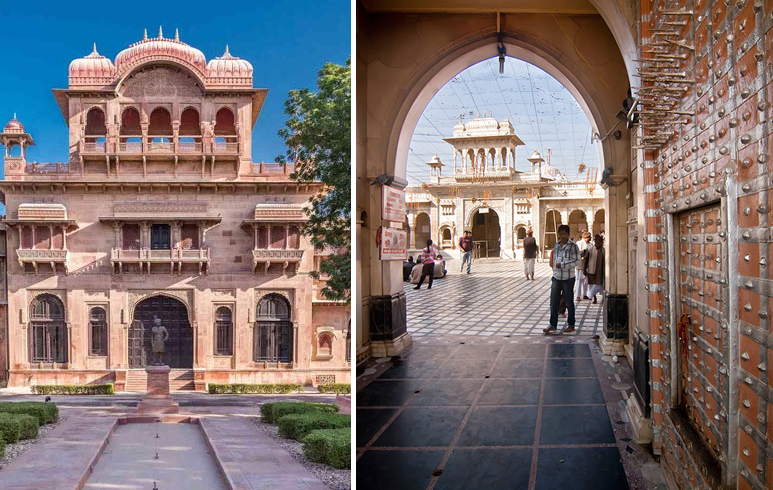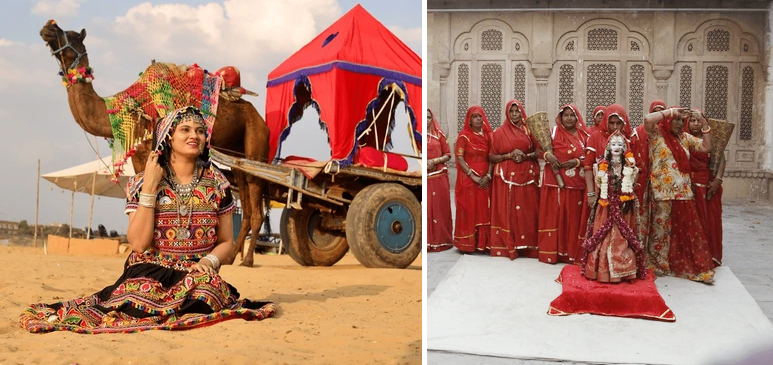Bikaner: The Desert Jewel of Rajasthan
- Location : In northern Rajasthan, about 330 km from Jaipur and 450 km from Delhi.
- Established : Founded in 1488 by Rao Bika, a Rajput prince from Jodhpur.
- Main Attractions : Junagarh Fort, Lalgarh Palace, Karni Mata Temple, Bhandasar Jain Temple, and vibrant local markets.
Bikaner, situated in the northern region of Rajasthan, is a desert city that boasts a rich cultural heritage, royal palaces, and vibrant festivals. Known for its well-preserved fort, temples, and the world-famous camel festival, Bikaner offers visitors an authentic Rajasthani experience, brimming with history, architecture, and local traditions. This city, founded in 1488 by Rao Bika, is an integral part of the desert triangle of Rajasthan, along with Jaisalmer and Jodhpur.

Historical Background
Founded by Rao Bika, a Rajput ruler and a descendant of the founder of Jodhpur, Bikaner grew to become a powerful princely state. The city’s strategic location on the ancient trade routes contributed to its prosperity. Over the centuries, Bikaner flourished under the patronage of its rulers, who built magnificent palaces, temples, and forts, leaving a lasting legacy for visitors to explore today.
Getting There
Bikaner is well-connected by road and rail, making it accessible from major cities like Jaipur (around 330 km) and Delhi (about 450 km). The nearest airport is in Jodhpur, approximately 250 km away. The city is also accessible via regular bus services and trains, including luxury services like the Palace on Wheels.
MAIN ATTRACTIONS IN BIKANER
Junagarh Fort
Junagarh Fort is one of the few forts in Rajasthan that was never conquered by invaders. Built in the 16th century by Raja Rai Singh, the fort is known for its impressive architecture and intricate designs. The fort complex includes numerous palaces, temples, and pavilions, each reflecting different architectural styles, from Rajput to Mughal and Gujarati influences. Inside the fort, visitors can explore the Anup Mahal, Ganga Mahal, and the beautifully adorned Phool Mahal, each telling stories of the city’s royal past.

Lalgarh Palace
Built by Maharaja Ganga Singh in the early 20th century, Lalgarh Palace is an architectural marvel that blends Mughal, Rajput, and European styles. The palace is renowned for its red sandstone façade, lush gardens, and detailed carvings. A part of the palace has been converted into a museum and hotel, offering visitors a glimpse into the royal lifestyle while experiencing luxury accommodations.
Karni Mata Temple (The Rat Temple)

Located about 30 km from Bikaner, Karni Mata Temple is a unique and fascinating pilgrimage site dedicated to Karni Mata, a revered Hindu goddess. What makes this temple famous is the thousands of rats that live within its premises. These rats, considered sacred, are believed to be reincarnations of Karni Mata's devotees. Visitors often come here to witness the unusual spectacle and seek blessings.
National Research Centre on Camel

Bikaner is known as the "Camel Country" due to its long association with camel breeding. The National Research Centre on Camel is an educational and tourist attraction that allows visitors to learn about different camel breeds, their importance in desert life, and the research conducted to improve their breeding. The centre offers camel rides, camel milk ice cream, and an opportunity to interact with these magnificent desert animals.
Bhandasar Jain Temple

This 15th-century temple, dedicated to Sumatinath (the 5th Tirthankara of the Jains), is an architectural gem. It is famous for its intricate carvings, vibrant frescoes, and the use of rich colors. Legend has it that 40,000 kg of ghee was used in the construction of this temple, which adds to its unique character.
Cultural Experience
Bikaner Camel Festival

The Bikaner Camel Festival is one of the city’s most iconic events, held annually in January. This vibrant festival celebrates the importance of camels in Rajasthan's desert culture. The festival features camel races, camel beauty pageants, folk dances, and traditional Rajasthani music. Visitors can enjoy local delicacies, shop for handicrafts, and immerse themselves in the lively atmosphere of the desert festivities.
Bikaji Ki Teej
Bikaner also celebrates the traditional Teej festival with great pomp. During this festival, women dress in colorful traditional attire, and the streets come alive with processions, songs, and dances. It is an excellent time for tourists to witness the cultural vibrancy of Bikaner.
Local Cuisine
Bikaner is a haven for food lovers, especially those who enjoy traditional Rajasthani cuisine. Some of the famous dishes include Bikaneri Bhujia, a spicy snack made from gram flour and moth beans, and Ker Sangri, a tangy dish made with desert beans and berries. Visitors should also try the Dal Baati Churma, a quintessential Rajasthani meal, and local sweets like Rasgullas and Ghewar.
Best Time to Visit
The best time to visit Bikaner is during the winter months, from October to March, when the weather is pleasant and suitable for sightseeing. Visiting during the Bikaner Camel Festival in January offers a unique cultural experience.
Travel Tips
- Clothing: Since Bikaner experiences extreme temperatures, lightweight cotton clothes are recommended during the summer months, while warm clothing is essential for the colder winter nights.
- Respect Local Traditions: When visiting temples or local markets, it is advised to dress modestly and respect local customs.
- Explore on Foot: To truly experience the charm of Bikaner, explore the old city on foot, where you can admire the beautiful havelis, narrow lanes, and vibrant markets.
Conclusion
Bikaner is a captivating destination that offers a perfect blend of history, culture, and tradition. From its majestic forts and palaces to its unique festivals and camel culture, Bikaner provides an authentic Rajasthani experience that is sure to leave a lasting impression. Whether you're wandering through the grand halls of Junagarh Fort or enjoying the festivities of the Camel Festival, Bikaner invites you to step into its royal past and experience the splendor of Rajasthan.